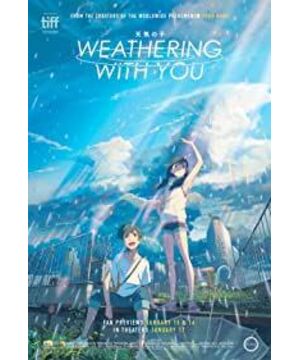Compared with the older generation of animation directors with Hayao Miyazaki, Makoto Shinkai pays more attention to modern social life, people-to-people distance and technological development.
The theme of this film is a topic worthy of discussion. At the beginning of the film, the plight of young people in Japan, especially in Tokyo society, is presented all the way. The male protagonist keeps talking about "Tokyo is terrible". In the animation film, the issues of real social life are told, and it is even a bit similar to the style of Bong Joon-ho, who is also a new-generation director.
In the second half, the heroine is willing to save others. Perhaps the usual movie should end like this, but it is obvious that the film is unwilling to end here, so you can see that the hero will save the girl regardless of the disaster of the world. Lord, and when we thought the movie would have a happy ending, at the end we find that Tokyo is truly overwhelmed.
I think this is the director's idea of the younger generation of Japan in modern society. When "the world itself is so crazy", Tokyo was submerged and it was just a return to two hundred years ago, and people's lives still have to go on. The world will not change for the better or worse, but the disappearance of the individual really disappears, and the separation of lovers is really separation.
So while traditional movies, especially Hollywood movies, keep talking about saving the world, this movie is about a couple who nearly "destroys" the world just to be together. This is a rebellion against our traditional Chinese social values, or the traditional Japanese social values that are also in the Confucian cultural circle, that the collective is always higher than the individual. And it closely combines the popular "house survival" and "mourning culture" in contemporary society, as well as the contemporary history of Japan's "lost 20 years". That is, when individual efforts can no longer change the society and the world, then why not take care of yourself and the flood of the world. But the movie is more radical and says that if changing the world comes at the expense of my personal life, then I would rather not change the world, because the so-called changing the world is only superficial in the end, and the world itself is crazy, so I am more Willing to pursue personal short-lived happiness, and who cares about the torrents of history that come and go.
View more about Weathering with You reviews











